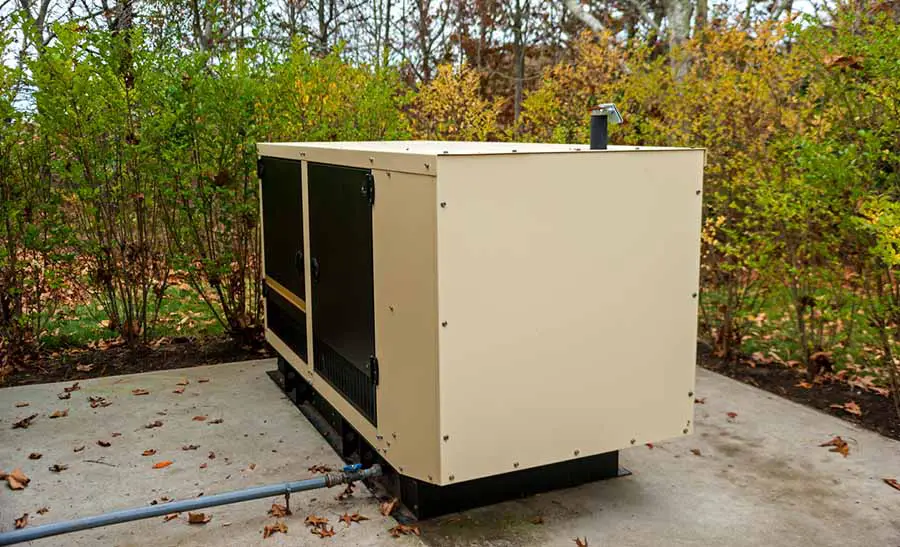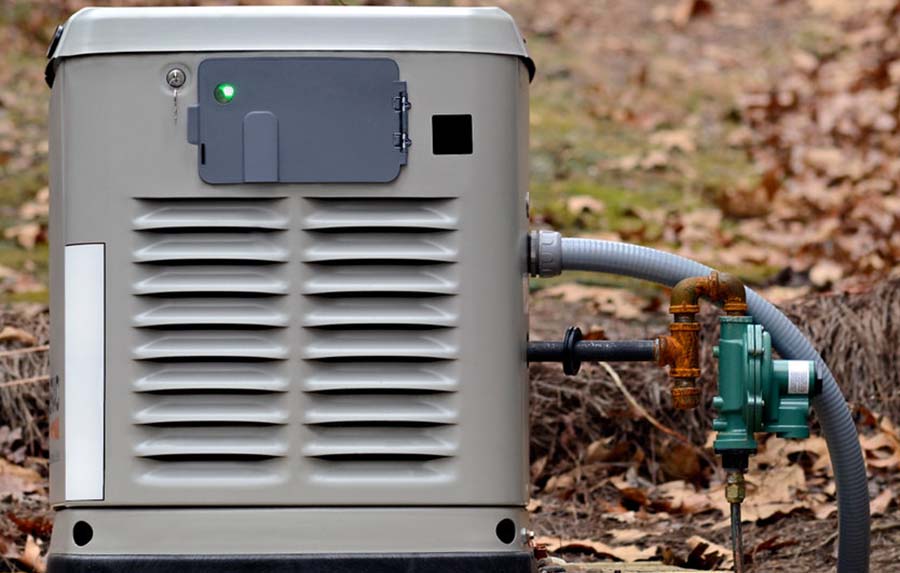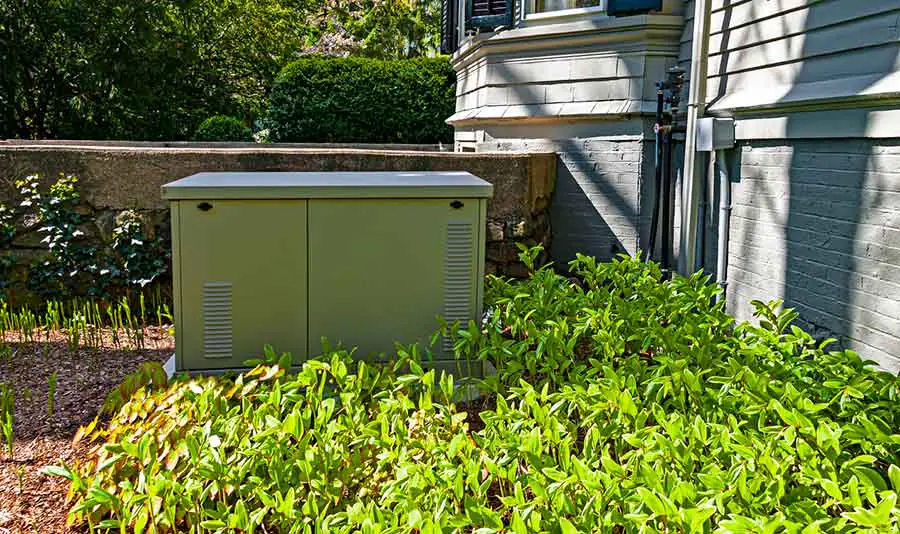
Nothing says your house is self-powered and entirely ready for anything the world may throw at it, like having a standby generator. Whether you are using the generator every two weeks or have the generator just on standby for the very worst, you’ll find yourself wondering when to service it.
You should service a standby generator every six months or after every 400 hours of use, whichever comes first. If you use your standby generator regularly, it’s best to service it every six months. If you don’t use your generator often, it will require maintenance every two to three years.
Above is just the standard schedule for servicing a standby generator, but there is quite a bit more to it. We have a few extra things that you need to know, and many people are sometimes unsure why you need to service a generator in the first place.
At What Intervals Should You Service a Standby Generator?
Depending on how often you use your generator, the number of services and the intervals between each will vary greatly. A generator that is run each day for hours on end but is well maintained will easily outlast one that is run every few months but never serviced.
Through experience, we have learned that many people assume their generators would easily keep running without too much work. You must understand why you need to service your generator at certain intervals and what happens if you ignore maintenance.
Every 400 Hours
If you are constantly using your generator, this is what you will need to keep in mind; running your generator for 3 to 4 hours each day is enough to reach this first. You will reach 400 hours of operation within four months, and you’ll likely need to do maintenance to the generator by then.
As you use your generator, the oil and filters will become dirty and need replacing. Counting how many hours you have the generator running each day will allow you to calculate when you’ll need to do maintenance on the machine; manually keeping count is doomed to failure.
Once Every 6 Months
This is the standard interval for people who use their generators more regularly.
Servicing the machine once every six months, replacing oil during this time, and replacing filters every 12 months, will allow a longer life. As the machine is not put through its paces each time, servicing it in this manner will enable you to have something that will work for years comfortably.
Once Every 2 Years
Most likely, you have a generator because you bought one during the last great flood or storm, and you’ve only used it a few times. Most people in more developed countries have generators only for emergencies, so they may forget to service the generator.
Generally, you will only have to replace the oil while checking on some of the rubber components and seals of the machine. A never-used generator requires very little maintenance and can be decommissioned entirely after several years, but you should still provide some basic care.
Why are There Different Intervals for Servicing a Generator?

Most professionals service generators based on how much work they have done and not how much time has passed. Because most generators do not have battery packs and typically run for extended periods, you usually schedule maintenance based on time rather than a set interval like other engines.
Many people become confused once they realize that generators are standard gas-powered engines with slight modifications. People wrongly assume that they can service their generators in the same intervals as their daily driver cars.
You must understand that generators are not like regular engines and can experience more wear and tear than a car engine. To properly service your generator, you must constantly count how and when you use the machine instead of simply relying on a maintenance cycle.
How Much Does It Cost to Maintain a Standby Generator?
For the US, servicing will cost around $200 to $300 throughout the year. Keeping in mind, you may only need to replace filters once every 12 months. As the size of the generator increases, so too do the cost, quickly reaching up to $650 per service.
The less you are servicing the generator, the more it will cost when you eventually service it. A generator that is behind on services usually needs to have everything inside it replaced. There have been instances where people have not serviced their generator, costing them thousands to fix it.
As you maintain your generator less and less, everything inside it becomes dirtier and dirtier, eventually causing more damage. More damage means it will cost more to get the generator back up and running, as you need to buy new parts for components that should have lasted a lot longer.
How Long Will a Standby Generator Last?
When you have your generator installed, ready to go, and have everything you need to service it, the question remains of how long it will last. Many people assume that generators, like cars, will last forever, while others assume they have extremely limited lifespans.
There are two ways of looking at how long your generator will last; generators serviced regularly and generators that rarely receive maintenance. Both of these heavily affect the overall lifespan of your generator and how much you can use it.
When Regularly Maintained
If you service your generator correctly, it can easily last well over 1500 hours, up to a maximum of 3000 hours. If you give the generator a significant service every two years, it may last well over 10,000 hours as long as you are not actively causing damage.
Many larger generators will last significantly longer than the small standby generators you may find in most homes. These generators have much larger components that you can fix and replace more easily than smaller generators normally would.
When Not Regularly Maintained
If you do not service a generator correctly, it may be lucky to last up to 1500 hours, with some larger standby generators lasting up to 2000 hours before breaking. The lifespan of a generator is greatly dependent on the quality of the oil; if the oil degrades, the engine will wear itself out.
Many people make the mistake of thinking that as long as the generator is cranking, it will be fine. However, this is not true as the machine and engine will keep working until the pistons inside are welded to the casing, and no component can freely turn anymore.
What Happens When You Don’t Service a Generator?

People who know some things about generators might assume that only one or two things will go bad when you do not service a generator. We have seen many people assume that the oil only does one thing and that the machine will be fine when the oil gets a bit older.
You need to understand how old, used, and overheated oils affect overall health each time the oil ages. Further, many other things happen when the generator is not serviced correctly throughout the machine’s lifespan that you must understand.
Lack of Oil
Oil in a closed system does not last forever; the oil ages are burnt up or used too much to be effective. As the oil becomes older and used, it may drop below usable levels, may no longer lubricate surfaces, or even have too many particles.
This causes a lack of oil that will heavily damage the insides of the generator, with a lot of people having their machines almost entirely seized. Oil helps the metal slide easier on more metal, which is why all engines must have some, preferably clean and healthy oil.
Component Damage
As the generator goes from new to not being appropriately serviced, the biggest problem will be that the parts inside are being damaged. Without the correct oil and filter, components need to work harder; metal pieces scrape against each other, and bearings begin to fail.
Component damage from a lack of service is often the main reason a generator cannot work, as the machine can no longer turn. Many engines become so damaged that the gears, belts, and pistons can no longer function, causing damage when moved.
Clogged Intakes
Probably the reason that many people that never service their generators find themselves considering doing it. Clogged intakes are when the filters on the machine are so dirty that no air or fuel can pass through them, stopping the generator from firing at all.
Dust can settle on the air intake, making it completely clogged, while particulates usually become encrusted on your fuel filter. Together this causes the system to become starved of fuel and oxygen quickly, the only two things it needs to cause internal combustion.
Engine Seize
This happens when everything is combined when there is no good oil, no fresh air, and the fuel struggles to reach the engine. The machine overheats, and the pistons responsible for internal combustion either blow out or melt, and the engine is no longer able to turn over.
While it is possible to repair a large engine that has seized, it is always expensive, and with smaller engine sizes, it can be almost impossible to repair. A seized engine is one of the worst things that can happen to your generator, causing it to become almost completely unusable.
What Can Help a Standby Generator Need Less Maintenance?
While we would all love to have our generators perfectly serviced and ready to go at all times, it can be a bit of a challenge. Doing the essential work can take a few minutes, but replacing everything and checking everything can take a few hours out of your weekend.
Preventing the need for a full service is always the best way to ensure that your generator does not need full yearly check-ups that can take time. Many experienced generator owners have learned to care for and maintain their machines with minor adjustments and some love.
- Housing: Easily, the most important part in keeping your filters and generator clean is giving it proper housing to live in. Just keeping the worst dust and rain away from the machine will ensure that it can enjoy a longer life.
- Servicing: Doing essential services to add clean oil and clean the filters will make everything last a lot longer. Many generators may not need any repairs until years after they have been run because they are being serviced and taken care of properly.
- Cooling: Your generator will need to be adequately cooled and taken care of when it starts to run a lot. Many generator owners assume the machine does not need any cooling but adding a fan or large vents to its housing will efficiently ensure that it never overheats.
- Starting: If you know the generator might be used regularly, but there is a slump in how it is being used, just starting the machine will be healthy. Letting the machine run and burn off excess fuel and just letting the oil heat up will allow it to run smooth continually.
- Cleaning: It can seem obvious, but many generator owners forget about the simple step of just keeping the machine clean. Using a rag and soapy water, just wiping off the grime and dust covering the machine will allow it to run clean continually.
- Fixing: We include this because many generator owners forget about the backyard solutions they create. When you need power, it is fine coming up with a quick solution, but you should ensure that whatever broke is properly fixed and taken care of.
- Not Overloading: Any engine pushed beyond its limits will be damaged; generators are no exception to this rule and can suffer heavily. When using the power made by the machine, you are drawing directly from it; drawing too much will cause the engine to be repaired more often.
Conclusion
You generally need to service your generator more than your ca, with the consequences of not doing so being a lot worse. Generators are instrumental pieces of equipment but are pretty sensitive to unexpected damage and a lack of care.
Whatever you do, please never try to use your generator when there is something wrong; no one wants an on-fire generator in their yard!
